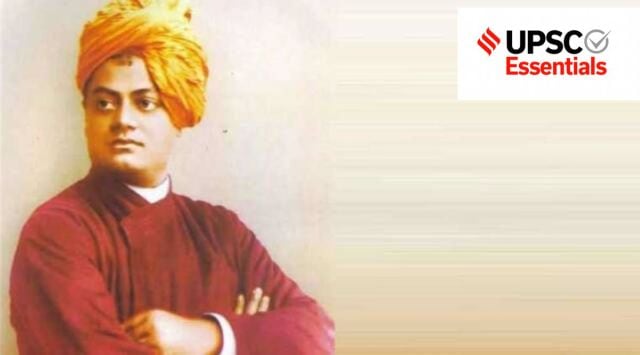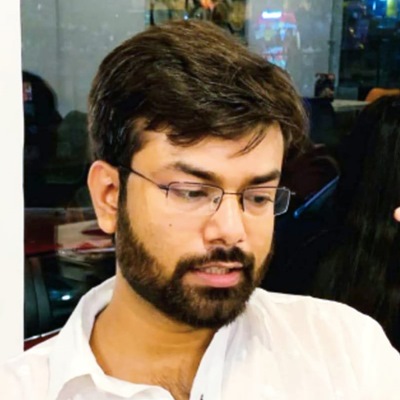UPSC Essentials | Mains answer practice: GS 4 —Ethics, Integrity and Aptitude (Week 3)
UPSC CSE Mains 2023 season has begun. Are you ready for it? Here are questions from GS paper 4 for this week with essential points as the fodder for your answers. Do not miss points to ponder and answer in the comment box below. Try them out!
 Attempt questions on Vivekananda and a case study in today's mains answer writing practice. (File)
Attempt questions on Vivekananda and a case study in today's mains answer writing practice. (File) 🚨 This story is part of our special initiative for UPSC and other competitive exams. Look out for UPSC KEY on weekdays and UPSC Essentials everyday, Weekly news express with MCQs, Key Terms of the past week, Quizzes as well as The Indian Express 360° Upsc Debate, Society & Social Justice, UPSC Mains Practice, Art and Culture with Devdutt Pattanaik, UPSC Ethics Simplified, Experts Talk, and more. 🚨
UPSC Essentials brings to you its new initiative for the practice of Mains answer writing. Mains Answer Writing will cover essential topics of static and dynamic parts of the UPSC Civil Services syllabus covered under various GS papers. This answer-writing practice is designed to help you as a value addition to your UPSC CSE Mains.
We will cover one new subject four days in a week. Attempt today’s answer writing on questions related to topics of GS-4 to check your progress. Come back tomorrow to attempt questions on topics related to GS-1.
QUESTION 1
Swami Vivekananda’s thought is as relevant to India’s future as it was in its past. Discuss.
QUESTION 2
CASE STUDY
Rashmi is assigned to teach Environmental Science in a Government High School in an industrial town. This is her first job. Rashmi believes in helping students to understand the syllabus of Science but also making them learn how these issues of Science are connected to Science in their society and community.
While teaching the topic related to human effects on climate change, Rashmi reached a point of discussing the impacts of industrialisation on the Environment and Climate change stressing negative pointers. It wasn’t directly mentioned in the syllabus. Many of the students belonged to the families of workers in the industries and factories of that town. Rashmi felt some unease from the side of the students while discussing the topic. This was confirmed when many of the parents complained about her to the Principal for disrespecting the industries which get bread and butter for them. The Principal calls for an explanation from Rashmi.
(a) What is the issue being addressed in the case?
(b) What should be highlighted in the explanation by Rashmi?
(c) If you were the Principal what would be your action? Justify.
THOUGHT PROCESS
You may enrich your answers by some of the following points
QUESTION 1
Swami Vivekananda’s thought is as relevant to India’s future as it was in its past. Discuss.
Introduction
You may either begin with a general historical fact or with a philosophical line. You may also connect it to youth (future) by the following fact:
Swami Vivekananda is the inspiration behind National Youth Day. In just 39 years, 14 of which were in public life, he filled the country with a thought whose energy is still felt today. Generations to come will continue to feel this energy.
Body
This is an open ended question but it is expected for you to have some historical and philosophical information. You may incorporate some of the following points in the body of your answer:
— One of India’s most important resources is the youth. Every fifth young person in the world is an Indian. It is due to this segment of the population that India’s growth rate has been the third-highest among the 13 major economies in the last five years. After the COVID-19 pandemic, India has emerged as a country that is full of possibilities in the race for development. Those among the youth who are associated with Swami Vivekananda’s ideas are preparing India for a leadership role on the world stage.
— “Arise, awake and stop not till the goal is reached.” This mantra of Vivekananda’s is as effective, relevant and inspiring today as it was in the days of colonialism. Now, India is ready to be a global leader. With the power of yoga and the energy that comes from spirituality, the youth of the country are impatient about giving direction to the world.
— Swami Vivekananda’s lessons still inspire the youth: “Make a life’s aim and incorporate that idea into your life…. Think that thought over and over again. Dream it, Live it… that is the secret to being successful.”
His mantra for the youth is evergreen: “Until you can trust yourself, you cannot trust Allah or God.” If we are not able to see God in other humans and ourselves, then where can we go to find divinity?
— Vivekananda caught the world’s attention with his ideas in Chicago in 1893. A speech like the one he made then could not be made today. The themes in that speech included “Vishwabandhutva”, tolerance, cooperativeness, participation, religion, culture, nation, nationalism and the collective India-Indianness.
— At the Parliament of World religions, Vivekananda said he is “from that Hindustan, which gives shelter to persecuted people from all religions and countries”.
— He addressed the Parliament of World Religions as: “American brothers and sisters”. The eternal message of universal brotherhood was clear in his speech. The New York Herald wrote: “Hearing him (Swami Vivekananda) seems that sending a Christian missionary to a knowledgeable nation like India is foolish. Even if he only passes through the stage, the applause starts.”
— Swami Vivekananda taught the world that it is our duty to encourage all those doing good so that they can make their dreams come true.
— His vision also gave rise to the idea of Antyodaya. Until the upliftment of the last poor person in the country is ensured, development is meaningless, he said.
— Swami Vivekananda’s belief about God is tied to every religion. His idea of charity is at the root of Sanatan Dharma. Charity was a way of life for him. For Vivekananda it was important to connect everyone with this way of life. He said, “The more we come to help and help others, the more pure our heart becomes. Such people are like God.”
Vivekananda’s legacy
— Through his speeches and lectures, Vivekananda worked to disseminate his religious thought. He preached ‘neo-Vedanta’, an interpretation of Hinduism through a Western lens, and believed in combining spirituality with material progress.
— ‘Raja Yoga’, ‘Jnana Yoga’, ‘Karma Yoga’ are some of the books he wrote.
— Before his death in 1902, Vivekananda wrote to a Western follower: “It may be that I shall find it good to get outside my body, to cast it off like a worn out garment. But I shall not cease to work. I shall inspire men everywhere until the whole world shall know that it is one with God.”
Conclusion
Connect back to the question. For example:
Swami Vivekananda combined thinking of different religions, communities and traditions. His thoughts inspire liberation from inertia. His ideas remain fresh and relevant for present and for future.
(Sources: Swami Vivekananda’s thought is as relevant to India’s future as it was in its past)
QUESTION 2
CASE STUDY
Rashmi is assigned to teach Environmental Science in a Government High School in an industrial town. This is her first job. Rashmi believes in helping students to understand the syllabus of Science but also making them learn how these issues of Science are connected to Science in their society and community.
While teaching the topic related to human effects on climate change, Rashmi reached a point of discussing the impacts of industrialisation on the Environment and Climate change stressing negative pointers. It wasn’t directly mentioned in the syllabus. Many of the students belonged to the families of workers in the industries and factories of that town. Rashmi felt some unease from the side of the students while discussing the topic. This was confirmed when many of the parents complained about her to the Principal for disrespecting the industries which get bread and butter for them. The Principal calls for an explanation from Rashmi.
(a) What is the issue being addressed in the case?
(b) What should be highlighted in the explanation by Rashmi?
(c) If you were the Principal what would be your action? Justify.
Introduction:
There can be many ways to start a case study. You may begin with a general statement that the case study highlights and then you may list down some of the stakeholders. Make sure the introduction should not be the same as the answer to part (a). For example:
The case explores the tensions a teacher, in her first job, faces in teaching a topic of impacts of industrialisation on the Environment and Climate change to students belonging to the community who work in the industries of that town.
Body:
(a) This part allows you to list down issues that may be between the lines. You may consider writing the following points:
This case directly highlights the consequences that can be faced while dealing with an issue sensitive to the communities.
Or
How should the values of the local community guide one’s actions and decisions?
And you may then briefly explain some key pointers from the case study which support your answer.
(b) While answering this part, use point format. You may ponder on some of the following points:
1. The role of a true teacher.
2. Duty without bias.
3. The teacher’s challenges with modern problems. Why is efforts to impart the reality of climate change important whether or not it is in the syllabus?
(Add your own points.)
(c) As a Principal, you are not only in-charge of the school but also a leader for teachers and a guardian at school for students. It is a test of your (Principal’s) leadership qualities. Some of the following statements can help you in deciding your questions.
| This is her first job. |
How important is this fact for the Principal? |
| Many of the students belonged to the families of workers in the industries and factories of that town. | Should teaching be affected by this aspect? |
| Rashmi reached a point of discussing the impacts of industrialisation on the Environment and Climate change stressing negative pointers. It wasn’t directly mentioned in the syllabus. | Is she right in taking up this topic? Should the Principal talk to her on dealing sensitive topics? |
| It was confirmed when many of the parents complained about her to the Principal for disrespecting the industries which get bread and butter for them. | How should this fact affect the action of the Principal? |
The above questions will act as a blue print for your answer. Think on the course of an action considering all dimensions and stake holders. Act as a Principal, and post your steps in the comments box.
Conclusion:
You may conclude by stating a line on teaching ethics and Principal’s role as a leader.
NOTE: You can have different methods, ways, and styles to answer a case study. Even the points may differ. However, they should be ETHICAL!
Post your inputs and answers to points to ponder in the comment box below and engage with other aspirants too. All the best!
(The UPSC Essentials Indian Express is now on Telegram. Click here to join our YouTube channel and stay updated with the latest updates.
Subscribe to The Indian Express UPSC Key and prepare for the Civil Services and other competitive examinations with cues on how to read and understand content from the most authoritative news source in India.)
Share your views, answers and suggestions in the comment box or at manas.srivastava@indianexpress.com




































